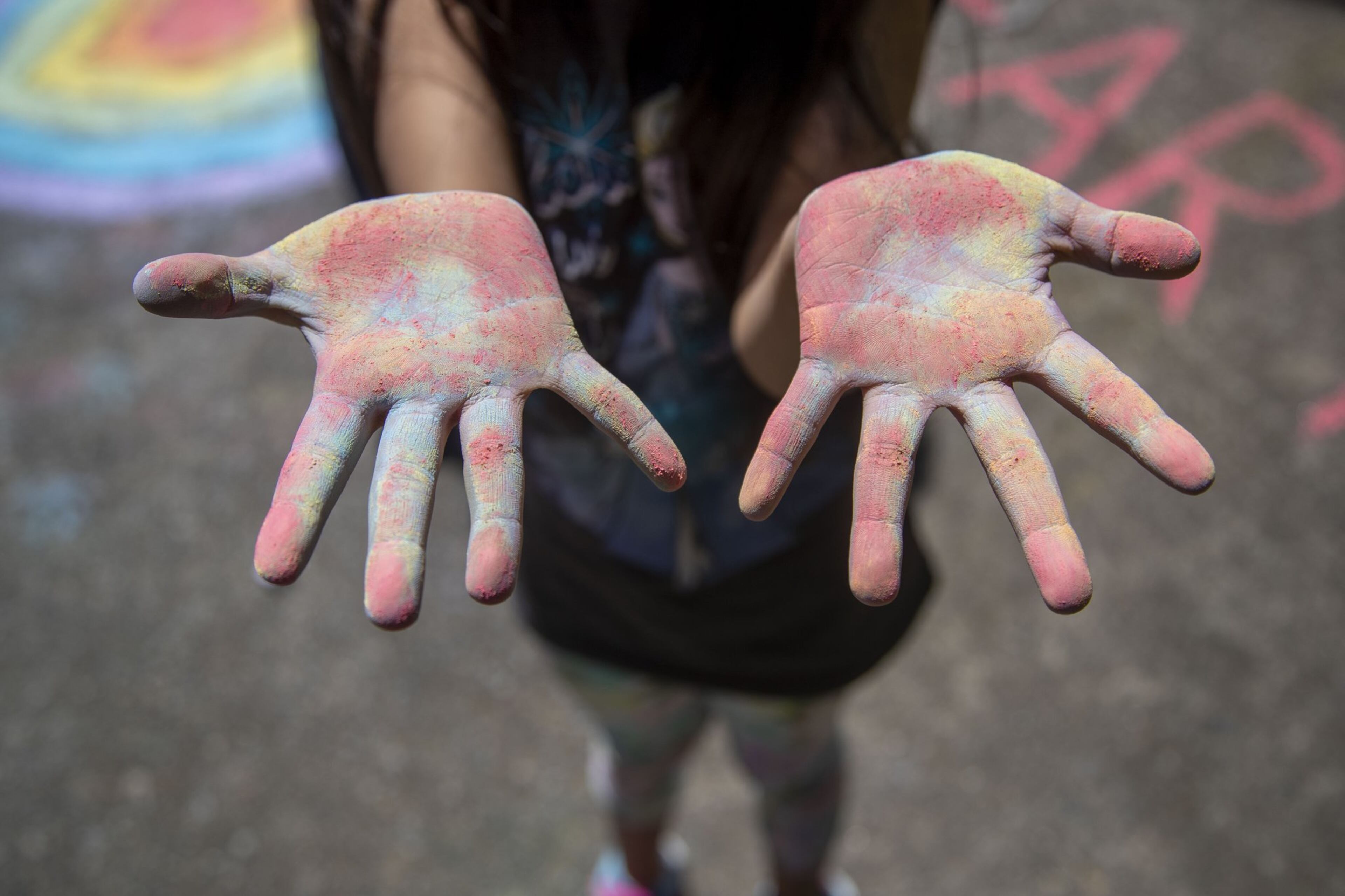Teacher makes Gwinnett driveway a chalkboard for lessons in caring











As the lone science teacher at Berkeley Lake Elementary, Kathy Bentley teaches all 798 children at the school. From pre-school to fifth grade, she supplements the lessons from their main teacher with hands-on experiments and additional activities like maintaining the school garden and hatching butterfly eggs.
And while right now the learning is at a distance, she wanted to find a way to let them know that the caring is never far away.
Living in the school’s attendance zone, Bentley has many students as neighbors. So she began drawing chalk messages in her driveway.
Related story: Distance learning was nothing new for one Gwinnett school
Related story: Parkview High sends bright message to honor students
“We had so much rain for a while that nature kept erasing them, so I’d do another once the cement dried,” she said.
The first few included her name so the kids realized they were from Ms. Bentley.
“I can’t go to the grocery story without running into one of my students,” she said. “One Halloween I dressed up as a science teacher,” she laughed. “The kids who didn’t know I lived there found out right away.”

Even though Dominque Cook has only one child, digital learning days coupled with working from home was sometimes stressful. Her first-grade son, Isaac, took well to school at home, but quickly ran out of things to do.
“Both my husband and I work from home right now and we can’t always do our work and make sure he’s occupied,” she said.
One activity that has become routine is the morning walks past Bentley’s house to check out the chalk drawings.
“It’s a great constant when so many other things are changing almost daily,” said Cook. “It’s a bright spot to start our day.”
Dr. Jennifer Shu, an Atlanta pediatrician, medical editor of the American Academy of Pediatrics’ HealthyChildren.org website, and a mom applauds Bentley’s effort to connect with students.
“That’s perfectly in tune with the age group and can help children cope with home-schooling situations that may be challenging,” she said. “I have my own 9-year-old and all that’s going right now can be trying for families.”
A recently released survey from EdWeek shows that student and teacher morale is suffering, according to teachers and school district leaders.
“Maybe it’s the loneliness or disconnection from colleagues and friends caused by stay-home orders and school closures. Or the frustration with the limitations and technical glitches of online learning. Or maybe the constant drumbeat of news about the rising coronavirus death toll, skyrocketing unemployment rates, and the uncertainty of what’s ahead is just too much to handle,” wrote the researchers in the executive summary.
Between March 25 and April 8, educators reported that morale was lower than it was before the pandemic for 61 percent of students and 56 percent of teachers. Two weeks later, they said that 76 percent of students and 66 percent of teachers are in lower spirits than they were before the crisis.
Dr. Shu urged parents and teachers to allow students to express concerns about the pandemic, missing friends, etc.
“Support can come in many forms,” she said.
Bentley recently invited neighborhood kids to help her with a drawing.
“This feels like school,” said first grader Lily Parsons. “It’s all my favorite subjects in one — art and recess!”

Parenting in a Pandemic: Tips to Keep the Calm at Home
Fear, uncertainty, and being holed up at home to slow the spread of COVID-19 can make it tough for families to keep a sense of calm. But it’s important to help children feel safe, keep healthy routines, manage their behavior and build resilience.
Here are some tips from the American Academy of Pediatricians to help families address children’s fears through the outbreak:
- Children rely on their parents for safety, both physical and emotional. Reassure your children that you are there for them and that your family will get through this together.
- Answer questions about the pandemic simply and honestly. Talk with children about any frightening news they hear. It is OK to say people are getting sick, but say following rules like hand washing and staying home will help your family stay healthy.
- Recognize your child's feelings. Calmly say, for example, "I can see that you are upset because you can't have your friends over." Guiding questions can help older children and teens work through issues. ("I know it is disappointing not to be able to hang with your friends right now. How do you think you can stay in touch with them?")
- Keep in touch with loved ones. Children may also worry about a grandparent who is living alone or a relative or friend with an increased risk of getting COVID-19. Video chats can help ease their anxiety.
- Model how to manage feelings. Talk through how you are managing your own feelings. ("I am worried about Grandma since I can't go visit her. The best I can do is to check in with her more often by phone. I will put a reminder on my phone to call her in the morning and the afternoon until this outbreak ends.")
- Tell your child before you leave the house for work or essential errands. In a calm and reassuring voice, tell them where you are going, how long you will be gone, when you will return, and that you are taking steps to stay safe.
- Look forward. Tell them that scientists are working hard to figure out how to help people who get ill, and that things will get better.
- Offer extra hugs and say "I love you" more often.
Source: American Academy of Pediatrics



